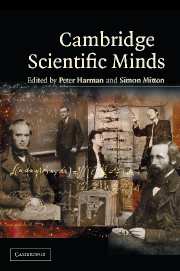Book contents
- Frontmatter
- Contents
- Foreword
- Introduction
- 1 William Gilbert
- 2 William Harvey
- 3 Isaac Newton: Creator of the Cambridge scientific tradition
- 4 William Whewell: A Cambridge historian and philosopher of science
- 5 Adam Sedgwick: A confident mind in turmoil
- 6 Charles Babbage: Science and reform
- 7 Charles Darwin
- 8 Stokes and Kelvin, Cambridge and Glasgow, light and heat
- 9 James Clerk Maxwell
- 10 The duo from Trinity: A.N. Whitehead and Bertrand Russell on the foundations of mathematics, 1895–1925
- 11 Thomson, Rutherford and atomic physics at the Cavendish
- 12 Hopkins and biochemistry
- 13 Charles Sherrington, E.D. Adrian, and Henry Dale: The Cambridge Physiological Laboratory and the physiology of the nervous system
- 14 Hardy and Littlewood
- 15 Arthur Stanley Eddington
- 16 Paul Dirac: A quantum genius
- 17 Alan Turing
- 18 Francis Crick and James Watson
- 19 Mary Cartwright
- 20 Joseph Needham
- 21 Molecular biology in Cambridge
- 22 The discovery of pulsars – prelude and aftermath
- 23 Stephen W. Hawking
5 - Adam Sedgwick: A confident mind in turmoil
Published online by Cambridge University Press: 05 June 2014
- Frontmatter
- Contents
- Foreword
- Introduction
- 1 William Gilbert
- 2 William Harvey
- 3 Isaac Newton: Creator of the Cambridge scientific tradition
- 4 William Whewell: A Cambridge historian and philosopher of science
- 5 Adam Sedgwick: A confident mind in turmoil
- 6 Charles Babbage: Science and reform
- 7 Charles Darwin
- 8 Stokes and Kelvin, Cambridge and Glasgow, light and heat
- 9 James Clerk Maxwell
- 10 The duo from Trinity: A.N. Whitehead and Bertrand Russell on the foundations of mathematics, 1895–1925
- 11 Thomson, Rutherford and atomic physics at the Cavendish
- 12 Hopkins and biochemistry
- 13 Charles Sherrington, E.D. Adrian, and Henry Dale: The Cambridge Physiological Laboratory and the physiology of the nervous system
- 14 Hardy and Littlewood
- 15 Arthur Stanley Eddington
- 16 Paul Dirac: A quantum genius
- 17 Alan Turing
- 18 Francis Crick and James Watson
- 19 Mary Cartwright
- 20 Joseph Needham
- 21 Molecular biology in Cambridge
- 22 The discovery of pulsars – prelude and aftermath
- 23 Stephen W. Hawking
Summary
Adam Sedgwick, geologist, was born in the village of Dent in the Yorkshire Dales on 22 March 1785. He died in Cambridge in 1873 at the age of eighty-eight. Translated from the Latin, his epitaph at Norwich Cathedral reads: ‘In Christ. To Adam Sedgwick, a Master among Philosophers, the Friend of Princes, the Delight of Little Ones, as One who Extended the Frontiers of Science, and was Fired with a Right Royal Love of Truth, whose Character was a Grand Simplicity, and whose Rock was the Faith of Christ, to Him, Once a Canon of the Church of Norwich, this Memorial is Raised by the Dean. 1873.’ Sedgwick would surely have wished to be remembered thus. Does his epitaph offer a fair assessment of the man? What was his character? How did he behave and think?
Sedgwick's family in the Dales can be traced to the thirteenth century. His father Richard was Vicar at Dent, which was a reasonably prosperous place in Adam's youth, in the days of the hand weavers and spinners; but, never industrialising, it declined in the nineteenth century, and it now does well chiefly by virtue of the tourist trade, the great granite Sedgwick memorial stone in the village centre being a major attraction, said to epitomise his character.
Adam was third of a family of seven. He attended the small ‘grammar school’ in Dent until he was sixteen and then had two years at the more prestigious Sedbergh School nearby.
- Type
- Chapter
- Information
- Cambridge Scientific Minds , pp. 64 - 78Publisher: Cambridge University PressPrint publication year: 2002
- 2
- Cited by



